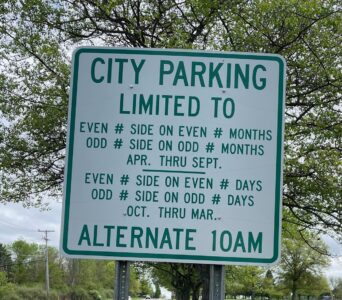Compelled Speech Discussed During Event

Randy Elf, constitutional, appellate and political speech lawyer, discussed compelled speech in the form of the Pledge of Allegiance. P-J photo by Dennis Phillips
There are two sides to a coin and also two sides to the U.S. Constitution’s First Amendment right of free speech.
Obviously, the First Amendment prevents the government from punishing a person for their speech. However, the First Amendment also prevents the government from punishing a person for refusing to articulate, advocate or adhere to a government’s approved messages.
The topic of compelled speech was at the heart of the Fenton History Center’s Brown Bag Lecture Wednesday, led by Randy Elf, constitutional, appellate and political speech lawyer. Elf, along with several attendees, discussed the merits of two Supreme Court rulings dealing with the Pledge of Allegiance.
In 1940, the high court ruled 8-1 in the Minersville School District v. Gobitis that every school student has to say and salute the Pledge of Allegiance and by doing so it doesn’t infringe upon one’s right to free speech or religious rights. The case was brought before the Supreme Court because the children of Jehovah’s Witnesses refused to say and salute the pledge because it went against their religious beliefs. The ruling found that the state’s goal to instill national unity and patriotism should not be overruled by the judiciary unless it significantly affected religious rights.
Elf said Supreme Court Justice Felix Frankfurter wrote the majority opinion on the case. In doing so, he relied primarily on the “secular regulation” rule, which weighs the secular purpose of a nonreligious government regulation against the religious practice it makes illegal or otherwise burdens the exercise of religion. He identified the Pennsylvania flag-salute requirement as an intrinsically secular policy enacted to encourage patriotism among school children. Frankfurter wrote that the school district’s interest in creating national unity was enough to allow them to require students to salute the flag. According to Frankfurter, the nation needed loyalty and the unity of all the people. Since saluting the flag was a primary means of achieving this legitimate goal, an issue of national importance was at stake
The only “no” vote on this case came from Harlan Stone who wrote the dissenting opinion. Stone wrote, “The guarantees of civil liberty are but guarantees of freedom of the human mind and spirit and of reasonable freedom and opportunity to express them … The very essence of the liberty which they guarantee is the freedom of the individual from compulsion as to what he shall think and what he shall say.”
Moving forward three years to 1943, the Supreme Court overruled its decision on the pledge and compelled speech by a 6-3 vote in the West Virginia State Board of Education v. Barnette case stating that it was unconstitutional for public schools to compel students to salute the flag. Between the 1940 decision and the one made in 1943, the Supreme Court had added some new members, including Robert H. Jackson, who wrote the majority opinion in the Barnette case.
Jackson said, sustaining the West Virginia rule would imply “that a Bill of Rights which guards the individual’s right to speak his own mind, left it open to public authorities to compel him to utter what is not in his mind.”
Jackson also stated, “If there is any fixed star in our constitutional constellation, it is that no official, high or petty, can prescribe what shall be orthodox in politics, nationalism, religion or other matters of opinion or force citizens to confess by word or act their faith therein.”
The ruling in 1943 came out on June 14, which is also known as flag day.




